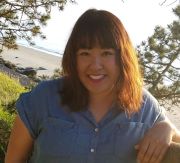
July 5, 2022
Occupational Health Nursing (OHN) trainee Eunice Soh received her PhD in Nursing Science in Spring 2022. Dr. Soh’s background and clinical training in nursing and public health provided opportunities for her to work and study in and outside the U.S, including at Johns Hopkins University in Baltimore, Maryland and with the Ministry of Health in Trinidad and Tobago. These experiences enriched her perspective and eventually led her to purse a PhD in Nursing Science with ERC support.

Dr. Soh’s dissertation focused on exploring the connection between worker health inequities and systems of power. Her work explored how systems of power perpetuate inequities through work and nonwork conditions. Informed by her prior clinical experiences and studies, she approached this work with an intersectional perspective. Intersectionality acknowledges that individuals embody many socially constructed identities (e.g., sex, race) at the person-level and these identities reflect macro-level systems of power (ideologies such as sexism and racism)[1]. With an intersectional approach researchers can analyze the power of social locations at the person-level and of systems of power at the macro level, thus shifting our viewpoint from person-level attributes to the processes that create systems and structures of inequity.
The three aims of her dissertation included:
- Aim 1: To explore if and how health equity terminology has been used in occupational health and safety (OHS) and worker health equity research, as well as to determine if and how systems of power concepts are included.
- Aim 2: To describe the employment conditions, working conditions, and nonwork conditions and the health status of the U.S. working classed at the intersections of sex, race, nativity, and class.
- Aim 3: To explore the association between general health and work and nonwork factors for female Latinx born-outside-U.S. working-classed workers.
The need for intersectionality and cross-interdisciplinary approaches to health equity research
For Aim 1, Dr. Soh’s research found that there were varied uses of work-and worker-related health equity and no explicit definitions for worker health equity or its variations in the 18 articles that qualified for the literature review. She discovered that while the majority of articles did mention systems of power concepts, only three articles integrated these concepts extensively.
For Aim 2, the dataset was subsetted by sex, race, and nativity to create intersectional groupings within the U.S. working classed (e.g., female Asian U.S.-born working-classed grouping). These intersectional analyses revealed that the female Latinx born-outside-U.S. grouping reported findings suggestive of more precarious work and nonwork conditions than for the other groupings across sexes, races, and nativity. Moreover, these findings were otherwise obscured, or missed, when examining the working classed as a whole.
For Aim 3, among three work (work arrangement, job insecurity, workplace safety) and three nonwork (healthcare access, housing affordability, food insecurity) predictors, worry about housing affordability was the only statistically significant predictor of worse general health for female Latinx born-outside-U.S. working-classed workers, after adjusting for education level.
With these findings Dr. Soh acknowledges the continued need for explicit definitions of health equity and its variations when using work- and worker-related health equity terminology. She also argues that systems of power concepts are essential in worker health equity research. An intersectional approach exposed precarious work and nonwork conditions for certain systemically marginalized positions otherwise missed by aggregate analyses. Situated knowledge or specific viewpoints that exist beyond disciplinary boundaries are necessary for understanding the various factors that impact the health of worker populations with different social identities and positions. Future worker health equity research will require researchers to venture beyond their disciplinary boundaries (ontological, epistemological, and methodological) in order to advance worker health towards a more equitable future.
Next steps
Dr. Soh recently joined Seattle Children’s Center for Diversity and Health Equity (CDHE) as a Health Equity and Diversity Consultant. In this role she collaborates with CDHE leaders to design interventions and develop educational solutions that meet staff and providers’ needs; provides consultation for the hospital workforce to explore barriers to providing equitable care; and overall helps to increase awareness of health disparities through research, data and evaluation, cultural humility, and community partnerships.
[1] For further information about intersectionality see works of Patricia Hill Collins, Kimberlé Crenshaw, Nikol Alexander-Floyd, as well as other works from Black feminist and anti-racist scholarship.
Cover photo credit: Adobe Images Shutter B, file #340694733.




